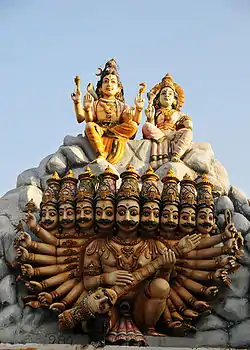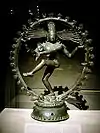Shiva Tandava Stotra
Shiva Tandava Stotra (Sanskrit: शिवताण्डवस्तोत्र, romanized: śiva-tāṇḍava-stotra) is a Sanskrit stotra (hymn) that describes Shiva's power and beauty. It is traditionally attributed to Ravana, the King of Lanka, who is considered to be a great devotee of Shiva.[1] It is believed that Ravana composed the hymn in praise for Shiva, and pleading for moksha.[2]

| Part of a series on |
| Shaivism |
|---|
 |
Verse
The stotra has 16 syllables per line of the quatrain, with laghu (short syllable) and guru (long syllable) characters alternating; the poetic meter is iambic octameter by definition. There are 16 quatrains in total.[3]
Both the ninth and tenth quatrains of this hymn conclude with lists of Shiva's epithets as destroyer, even the destroyer of death itself. Alliteration and onomatopoeia create rolling waves of resounding beauty in this example of Hindu devotional poetry.[4]
In the final quatrain of the poem, after tiring of rampaging across the earth, Ravana asks, "When will I be happy?" Because of the intensity of his prayers and ascetic meditation, of which this hymn was an example, Ravana received from Shiva powers and a celestial sword called Chandrahas.[5][6][7]
The story is that Ravana, a devotee of Shiva who was also the king of Lanka, tried to take kailasa, the abode of Shiva, to Lanka in his shoulders. So Shiva, who wanted to teach him a lesson placed his big toe upon kailasa which caused it to come crashing down over Ravana. Realising the power of Shiva and out of agony he plucked his intestines and played a tune and sang a praise dedicated to Shiva, which, in time came to be known as the Shiva Tandava Stotram.
Origin of word Tandava
The word Tandava in Shiva Tandava is derived from the word 'Tandul' which means to jump. Tandava is a type of dance that is performed with great energy and strength. Bouncing with vigor makes the mind and brain powerful. Normally men perform the Tandava.
Story
Ravana is considered to be a devotee of Shiva. The Ravana whom we know by the name of Lankapati is the brother of Kubera, from whom he had grabbed Lanka to become the king of Lanka himself.
After becoming the king, Ravana thought he was invincible. One day, Ravana was going to Lanka, then on the way he saw Mount Kailasa. But even after millions of attempts, Ravana's plane could not climb that Kailasa mountain. Just then, Ravana saw Nandi the bull. When Ravana asked Nandi why he couldn't cross Mount Kailasa, he said that this mountain is the abode of Shiva and Parvati, so no stranger can climb it. In pride, Ravana considered this as an insult and angrily tried to uproot the mountain with all his hands. Due to which that mountain started moving badly. On seeing such a situation of Parvati, Parvati got nervous and complained to Shiva. So Shiva, who wanted to teach him a lesson placed his big toe upon Kailasa which caused it to come crashing down over Ravana, Ravana's hand was pressed under the mountain, after which he groaned with pain and started apologizing. Realising the power of Shiva and out of agony he plucked his intestines and played a tune and sang a praise dedicated to Shiva, which, in time came to be known as the Shiva Tandava Stotra.[8] Then Shiva was pleased with his devotion and gave him blessings.
Media adaptations
Parts of the stotra was recreated as a song in the following Indian films:
- Bhookailas (Telugu)
- Sita Rama Kalyanam (Telugu)
- Bala Ramayanam (Telugu)
- Ranavikrama (Kannada),
- Aabra Ka Daabra (Hindi)
- Luck (Hindi)
- Ab Tumhare Hawale Watan Saathiyo (Hindi)
- Oxygen (Marathi),
- Singham (Hindi),
- Baahubali: The Beginning (Telugu)[9]
- Nandanam (film) (Malayalam)
- Thandavam (Malayalam)
- Lingaa (Tamil)
- The Attacks of 26/11 (Hindi)[10]
- Shivaay (Hindi)
- Dharam Sankat Mein (Hindi)
- Risk (Hindi)
- Satyameva Jayate 2018 (Hindi)
- Manikarnika: The Queen of Jhansi 2019 (Hindi)
- iSmart Shankar 2019 (Telugu)
- Nani's Gangleader 2019 (Telugu)
- Pattas 2020 (Tamil)
References
| Sanskrit Wikisource has original text related to this article: |
- Vālmīki; Menon, Ramesh (2004-05-26). The Ramayana: A Modern Retelling of the Great Indian Epic. Macmillan. ISBN 978-0-86547-695-0.
- Ayres, Elizabeth (2005). Know the Way: A Journey in Poetry and Prose. Infinity Publishing. ISBN 9780741428257.
- "Shivatandavastotra". Full text at Wikisource. Retrieved 20 November 2018.
- Ramachander, P. R. "Shiva Thandava Stotram". saivism.net. Retrieved 25 July 2018.
- Bennett, James (7 June 2017). Beneath the Winds: Masterpieces of Southeast Asian Art from the Art Gallery of South Australia. Australia: Art Gallery of South Australia. p. 251. ISBN 978-1921668074.
- Cakrabartī, Bishṇupada (24 July 2008). The Penguin Companion to the Ramayana. Penguin. p. 91. ISBN 978-0143100461. Retrieved 24 July 2018.
- Social, Daily. "12 Of The Most Powerful Divine Weapons From Hindu Mythology". Daily Social. Retrieved 24 July 2018.
- "Shiv Tandav Stotra". newstrend.news. Retrieved 29 April 2020.
- Times, Hindstan (Jul 31, 2015). "Singing Baahubali's Shiv Stotram gave me goosebumps: Kailash Kher". HIndustan Times. Retrieved 23 July 2018.
- Team, Indicine. "Maula Maula Lyrics – The Attacks of 26/11". Indicine. Retrieved 23 July 2018.

